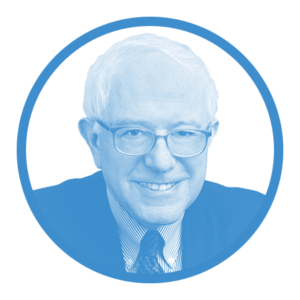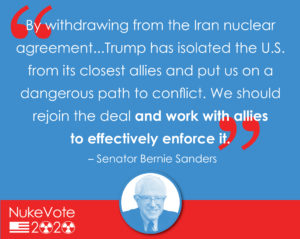
BERNIE SANDERS (D)
U.S. Senator, Vermont
Questionnaire
Candidates were given the option to add additional comments after answering each yes or no question. Some chose to give explanations for each answer, while some gave explanations for some answers, and some gave no explanations at all. Click on each question below to see answers and any additional comments from candidates.
Do you agree with former President Ronald Reagan’s statement that a nuclear war can never be won and so must never be fought?
YES. This is common sense. But our current nuclear policy does not recognize this basic truth. The first step to making sure a war is never fought should be to declare that we will never start one. That is why I am a cosponsor of S.200, a bill that would prohibit the launching of a nuclear strike first absent a declaration of war by Congress and S. 272, a bill that would make it the official policy of the United States never to use a nuclear weapon first. As president I would pledge never to start a nuclear war and work to get the other nuclear-armed countries to make similar declarations. But that is just a first step. We need to bring the United States and the rest of the world together to do everything we can to rid this world of nuclear weapons.
Should the United States extend the New Strategic Arms Reduction Treaty, provided that the Russian Federation remains in compliance with the agreement?
YES. Absolutely. It is the last remaining legal restraint on US and Russian nuclear arms. It is the national security interest of the United States to have these restraints and to have the system of on-site verification that allow us to know in great detail what the Russians are doing with their long-range nuclear weapons. It is beyond foolish to allow this treaty to expire, but that is exactly what the Trump administration is doing. As president, I would extend this treaty and work on a new agreement to reduce dramatically US and Russian nuclear arsenals.
Do you agree that a verifiable, multilateral diplomatic agreement is the best way to deal with the proliferation threat posed by Iran?
YES, and so do our closest allies. France, Germany and the United Kingdom urged Trump not to leave the JCPOA, and his decision to do so isolated the US. The JCPOA is one of the strongest non-proliferation agreements ever negotiated. It stopped a war with Iran; it blocked all of Iran’s paths to a nuclear bomb. As president, I would immediately rejoin this agreement, bring Iran back into compliance with the agreement and get to work on additional measures that can address our other issues with Iran and extend the limitations imposed by the agreement.
Do you support continued diplomacy with North Korea with the goal of negotiating the eventual denuclearization of the Korean Peninsula?”
YES. Every step we take to reduce North Korea’s nuclear force, to open it up to inspections, to end the 70-year-old Korean War and to encourage peaceful relations between the Koreas and the United States increases the chances of complete denuclearization of the peninsula. Peace and nuclear disarmament must proceed in parallel, in close consultations with our South Korean ally. I will work to negotiate a step-by-step process to roll back North Korea’s nuclear program, build a new peace and security regime on the peninsula and work towards the eventual elimination of all North Korean nuclear weapons.
Do you support the new low-yield nuclear weapons called for in the Trump Administration’s 2018 Nuclear Posture Review?”
NO. These weapons should never be built.
Do you believe the United States can maintain a safe, secure, and effective nuclear arsenal for less than the current estimated costs of $1.2 trillion over the next 30 years?”
YES. We can defend the United States and our allies for far less money. In fact, your estimate is too low. The actual estimated cost adjusted for inflation is $1.7 trillion and even that is an under estimate. Military weapon programs never come in on budget. The real bill is going to be more like $2 Trillion or $3 Trillion. We do not need and cannot afford to spend that much money on weapons designed to fight a 20th Century war when we have so many 21st Century challenges that require our immediate, concentrated attention and resources.
Should the United States review its current policy that reserves the right to use nuclear weapons first?”
YES, as answered in the first question.
Do you agree that a verifiable, global ban on explosive nuclear testing is in the national security interest of the United States?”
YES, as president I would bring the Comprehensive Nuclear Test Ban Treaty up for approval by the Senate as the earliest opportunity when I can be assured of its passing.
In the context of strategic stability, do you agree that there is a relationship between offensive and defensive weapons systems?”
YES, any time you put up a defense, your opponent increases their offense to overcome it. Richard Nixon understood this. That is why he negotiated a treaty limiting ballistic missile defense as an integral part of his first treaty limiting US and Soviet long-range offensive weapons in 1972.
Should the United States halt further deployment of a national missile defense system until it is successfully tested under realistic conditions and proven effective?”
YES. It is foolish to spend billions of dollars — which is what we are doing right now and have been doing under both Republican and Democratic administrations — to build and deploy systems that have not been rigorously tested under realistic combat conditions. It gives us the illusion of security that could lead to very flawed and dangerous decisions.
Key Quotes
In the News
- Senate Democrats push for arms control in defense policy bill (The Hill, August 21, 2019)
- Sanders backs Warren after Liz Cheney attacks ‘no first use’ nuclear policy (The Guardian, August 3, 2019)
- Ending America’s Endless War (Foreign Policy, June 24, 2019)
- What would Bernie bomb? (POLITICO, June 23, 2019)

